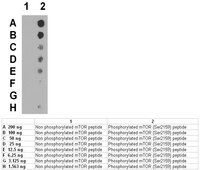mTOR kinase domain phosphorylation promotes mTORC1 signaling, cell growth, and cell cycle progression.
Ekim, B; Magnuson, B; Acosta-Jaquez, HA; Keller, JA; Feener, EP; Fingar, DC
Molecular and cellular biology
31
2787-801
2010
Mostra il sommario
The mammalian target of rapamycin complex 1 (mTORC1) functions as an environmental sensor to promote critical cellular processes such as protein synthesis, cell growth, and cell proliferation in response to growth factors and nutrients. While diverse stimuli regulate mTORC1 signaling, the direct molecular mechanisms by which mTORC1 senses and responds to these signals remain poorly defined. Here we investigated the role of mTOR phosphorylation in mTORC1 function. By employing mass spectrometry and phospho-specific antibodies, we demonstrated novel phosphorylation on S2159 and T2164 within the mTOR kinase domain. Mutational analysis of these phosphorylation sites indicates that dual S2159/T2164 phosphorylation cooperatively promotes mTORC1 signaling to S6K1 and 4EBP1. Mechanistically, S2159/T2164 phosphorylation modulates the mTOR-raptor and raptor-PRAS40 interactions and augments mTORC1-associated mTOR S2481 autophosphorylation. Moreover, mTOR S2159/T2164 phosphorylation promotes cell growth and cell cycle progression. We propose a model whereby mTOR kinase domain phosphorylation modulates the interaction of mTOR with regulatory partner proteins and augments intrinsic mTORC1 kinase activity to promote biochemical signaling, cell growth, and cell cycle progression. | 21576368
 |









